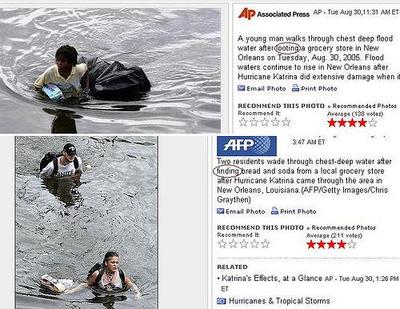There's been plenty said elsewhere. But here are a few of my thoughts.
Firstly, it's not got much to do with global warming, and it's especially not about Kyoto or other emission controls. Even if GW has made hurricanes worse, the effect so far is pretty small, and anyway no realistic emission controls would make a substantial difference to the future risks in the short-term. New Orleans was a disaster waiting to happen, and as I said before, the important point about natural hazards is to recognise and plan for them, so as to prevent the consequential human disaster rather than the natural event itself.
 (USAToday cartoon)
(USAToday cartoon)
Living in a zone highly affected by both typhoons (local term for hurricane - the meteorological phenomenon is the same) and earthquakes, I'm not going to throw stones about how silly it is to build a city in such a location. The big problem with New Orleans has been in the planning and response. Everyone knew that a coastal city in hurricane alley, well below sea level and surrounded by water on three sides, was vulnerable: it was only ever a question of when, not if, the existing (decaying and subsiding) defences would be breached if they were not improved.
When the decision was made to evacuate the city, the media was awash with pictures of bumper-to-bumper traffic on the freeways. But what about those with no car (about 30% of the poorest households nationally, which must mean a lot of people in city as poor as NO)? The sick, or elderly?
Once the scale of the flooding was known, I'm astonished that the army was not sent in immediately and on a substantial scale to pull people out ASAP. What did they think was going to happen as food and water ran out? Of course, the Great American Public was never going to loot and riot, was it? At least the whites haven't been...

As far as "finding" food and essentials, of course, I should make it clear that I don't blame them. Such a desperate situation calls for desperate measures. It sure is a good thing that so many citizens have guns and are forming "well regulated militia" :-)
Someone needs to answer some serious questions about why this much-predicted scenario was allowed to develop in such a disastrous fashion. From the erosion of natural wetland protection, through inadequate funding of the levees, to the tardy and inadequate response, it's been cock-up after cock-up. The hurricane may have been natural, but the disaster has been largely man-made. Of course it isn't all the fault of this one man, but he is where the buck stops:

As for rebuilding the city....yeah, right. All of the tertiary industry will already have relocated, or at least be in the process of doing so as the evacuees get back on their feet. I doubt there's much business for banks, lawyers or hairdressers downtown right now. The problem isn't so much the total cost as the fact that the whole city will be uninhabitable for months. Of course all the port trade has to go somewhere, so I'm sure the city will regrow eventually in some form, but it's not going to be like the usual hurricane repair job.
Firstly, it's not got much to do with global warming, and it's especially not about Kyoto or other emission controls. Even if GW has made hurricanes worse, the effect so far is pretty small, and anyway no realistic emission controls would make a substantial difference to the future risks in the short-term. New Orleans was a disaster waiting to happen, and as I said before, the important point about natural hazards is to recognise and plan for them, so as to prevent the consequential human disaster rather than the natural event itself.
 (USAToday cartoon)
(USAToday cartoon)Living in a zone highly affected by both typhoons (local term for hurricane - the meteorological phenomenon is the same) and earthquakes, I'm not going to throw stones about how silly it is to build a city in such a location. The big problem with New Orleans has been in the planning and response. Everyone knew that a coastal city in hurricane alley, well below sea level and surrounded by water on three sides, was vulnerable: it was only ever a question of when, not if, the existing (decaying and subsiding) defences would be breached if they were not improved.
When the decision was made to evacuate the city, the media was awash with pictures of bumper-to-bumper traffic on the freeways. But what about those with no car (about 30% of the poorest households nationally, which must mean a lot of people in city as poor as NO)? The sick, or elderly?
Once the scale of the flooding was known, I'm astonished that the army was not sent in immediately and on a substantial scale to pull people out ASAP. What did they think was going to happen as food and water ran out? Of course, the Great American Public was never going to loot and riot, was it? At least the whites haven't been...

As far as "finding" food and essentials, of course, I should make it clear that I don't blame them. Such a desperate situation calls for desperate measures. It sure is a good thing that so many citizens have guns and are forming "well regulated militia" :-)
Someone needs to answer some serious questions about why this much-predicted scenario was allowed to develop in such a disastrous fashion. From the erosion of natural wetland protection, through inadequate funding of the levees, to the tardy and inadequate response, it's been cock-up after cock-up. The hurricane may have been natural, but the disaster has been largely man-made. Of course it isn't all the fault of this one man, but he is where the buck stops:

As for rebuilding the city....yeah, right. All of the tertiary industry will already have relocated, or at least be in the process of doing so as the evacuees get back on their feet. I doubt there's much business for banks, lawyers or hairdressers downtown right now. The problem isn't so much the total cost as the fact that the whole city will be uninhabitable for months. Of course all the port trade has to go somewhere, so I'm sure the city will regrow eventually in some form, but it's not going to be like the usual hurricane repair job.
1 comment:
The major issue is that the port, which extends from maybe Baton Rouge down practically to the mouth of the Mississippi CANNOT be relocated. It is the major port for US grain shipments, a major port for oil, and much else.
There are, however, many hydrological things which can be done at reasonalbe costs.
http://www.nytimes.com/2005/09/02/opinion/02fischetti.html?incamp=article_popular_5
(search Coast 2050).
Eli Rabett
Post a Comment